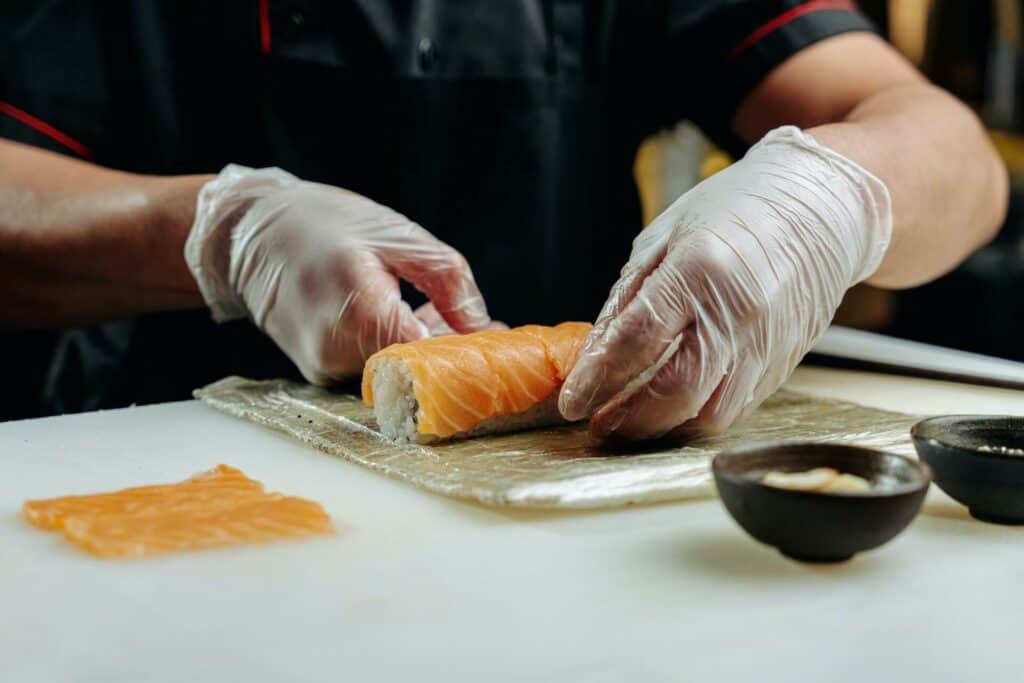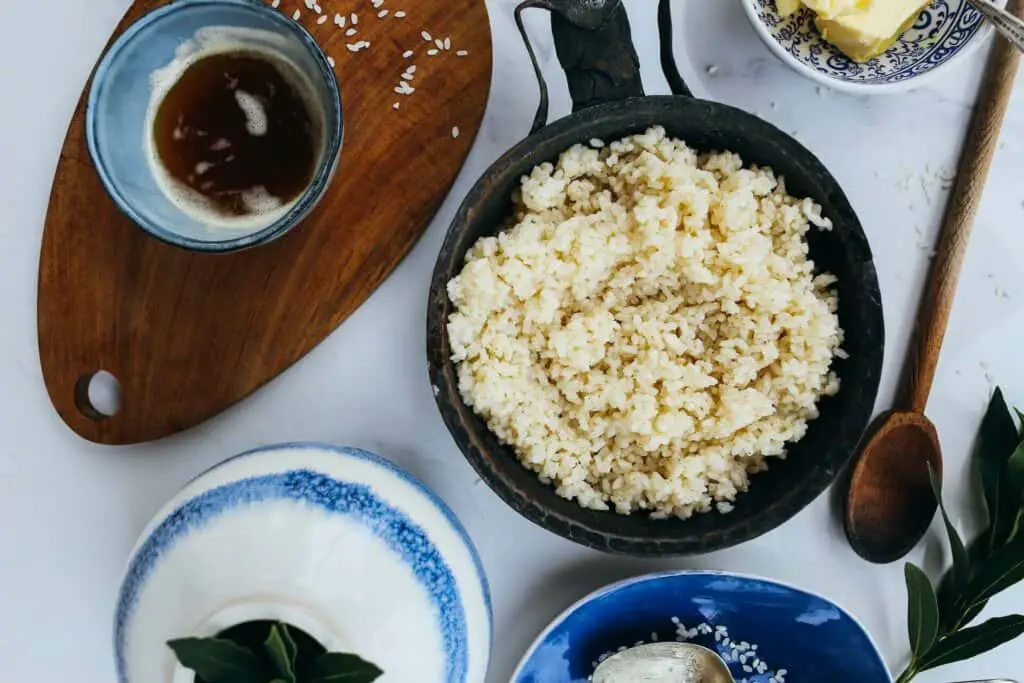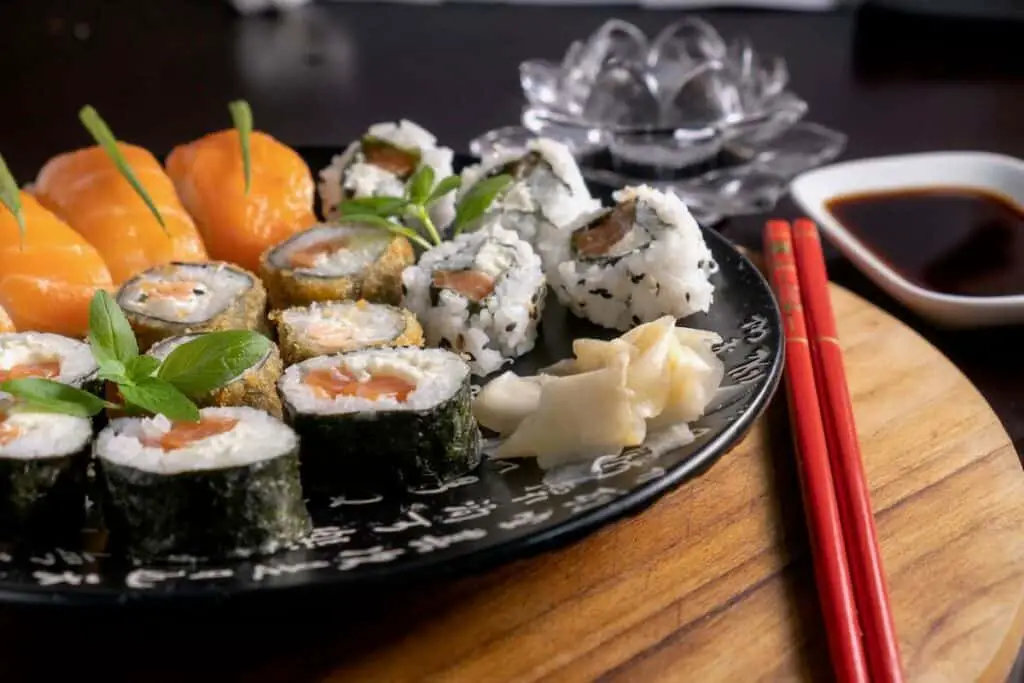Sushi is one of the most popular dishes in the world, but does it contain alcohol? Many people believe that sushi contains sake, a Japanese rice wine, but is that really the case? In this blog post, we’ll explore the question of whether or not sushi has alcohol and take a closer look at what ingredients are used to create this delicious dish.
Does sushi have alcohol? Sushi can contain alcohol. Specifically, some types of sushi use vinegar that has been brewed with sake or mirin (rice wine). While the alcohol content is usually very low (less than 1%), it can vary depending on the type of vinegar and the amount used.


Learn here how to find alcohol-free sushi and make the most out of your experience with this Japanese delicacy.
Does Sushi Have Alcohol, and Is It Safe to Eat?
Sushi occasionally contains alcohol, depending on where you go to eat it. What does location have to do with it? Japanese chefs typically use mirin because it’s a traditional seasoning, so you’re more likely to see alcoholic sushi vinaigrette in Japan and authentic restaurants.
An authentic Japanese restaurant may not offer alternatives like white vinegar in their sushi su (the name for sushi rice vinaigrette,) but you can always call them beforehand and check.
Additionally, Saudi Arabia is a primarily Islamic country with numerous sushi restaurants, so you’ll never see chefs using mirin to season rice there. They’ll use white vinegar instead since Islam forbids its believers from consuming alcohol. This is what we know as haram.
What Is Mirin, the Only Alcoholic Ingredient In Sushi?
Mirin is a rice wine that contains more sugar than sake but has a similar alcohol percentage – around 14%, just like any other wine.
There are three kinds of mirin – hon mirin (also known as true mirin) contains the most sugar and 14% alcohol; shio mirin (or salt mirin) has 1,5% salt in it. It was created with salt to prevent direct consumption; shin mirin (or new mirin) contains the same flavor as true mirin but only has 1% of alcohol.
Japanese dishes heavily rely on mirin to provide flavor and seasoning, from dumplings and noodles to sushi rice. Some Japanese chefs opt for using rice wine vinegar which is entirely alcohol-free, but it tastes more bitter and doesn’t always give sushi its signature flavor.

Can People Who Don’t Drink Alcohol Eat Sushi?
Yes, people who don’t drink alcohol can enjoy sushi without fear. You can find restaurants where chefs use rice wine vinegar to season the rice and enjoy the meal there. It’s good to ask the restaurant you wish to visit before going there.
While mirin is available in stores and supermarkets, rice wine vinegar may be slightly easier to find. This is why many people (and restaurants) opt for vinegar-based seasoning, thus creating perfectly safe, non-alcoholic meals.
Sushi That Doesn’t Have Mirin Is Completely Halal
The Islamic law forbids believers from eating certain foods, which we call haram. Alcohol is considered haram, and if someone of Islamic faith wishes to visit a sushi restaurant, they may get disappointed if the sushi seasoning contains mirin.
Still, if we exclude mirin from the equation, which is entirely possible, all other ingredients in classic and traditional sushi are halal or allowed for consumption by Islamic law. It’s essential that everyone can enjoy certain delicacies without feeling guilty or like they’re not included.
This may not be why Japanese chefs introduced the vinegar alternative, but they found a way to make sushi accessible to various nationalities and people of all backgrounds. It’s not one of the world’s most loved foods for nothing.

The Common Sushi Ingredients Are Completely Safe and Healthy for Most People
If you didn’t know sushi contained traces of alcohol, you might wonder – what else is in sushi? The good news is that you can see the ingredients while eating the rolls, so there’s not much hiding in there. What could there be but fish, rice, seaweed, and some veggies?
Well, sushi rice isn’t plated cleanly cooked – there’s sugar, rice wine or vinegar, and some salt added to it. If you’re looking to reduce your sugar intake, don’t consume alcohol even in traces, or avoid salt because of high blood pressure, you may not feel as happy with sushi as others would.
Potentially Unsafe Ingredients In Sushi (Allergenic Foods)
Soy sauce, or sushi sauce, is a common ingredient that accompanies sushi, but it contains soy and gluten, two prevalent allergens. Gluten sensitivity has become increasingly common nowadays, and soy sauce is not the best thing to consume if this is the case for you.
Some restaurants use surimi crab sticks instead of real crab meat in their rolls. However, surimi sticks aren’t crab – they’re white fish mixed with crab flavoring and red dye. The additives in the imitation crab contain gluten, so if you flare up after a small meal, think back on the ingredients and if one of them was surimi.
Some other allergenic foods can be:
- Cream cheese (dairy),
- Tuna (shellfish/fish),
- Salmon (shellfish/fish),
- Crab (shellfish),
- Tofu (soy),
- Tempura shrimp (gluten/shellfish/soy),
- Edamame (soy).
You Can Find Alcohol-Free Sushi Variations Anywhere
The good news is that sushi without mirin is widely available, and you don’t have to dismiss the idea of trying this signature Japanese dish. If you’re unable to consume alcohol, it’s OK. Many chefs are aware of certain dietary restrictions and do their best to make their meals accessible to everyone. Go ahead, order some sushi and enjoy yourself.